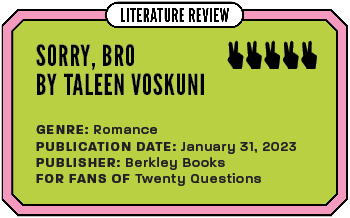‘Sorry, Bro’: A bingeable and original debut novel

“Sorry, Bro” — a heartfelt, charming rom-com debut by Armenian American author Taleen Voskuni — merges the traditional aspects of Armenian culture with the modern world to tell the story of a queer Armenian woman coming into her own, while also falling in love.
The story follows Nareh Bedrossian, or Nar, an Armenian American woman living in San Francisco who has just turned down the marriage proposal of her non-Armenian boyfriend. Nar is unfulfilled — she makes decisions to please her family, her boss does not take her seriously as a reporter and she feels hopelessly disconnected from her culture. As a newly single woman, Nar’s mother pressures her to attend Explore Armenia, a month-long series of events that include activities such as Armenian cooking lessons, dancing and brandy tasting, in order to meet potential suitors and hopefully a good Armenian husband.
However, Nar soon realizes that her interests may lie more with her wingwoman, Erebuni, and must wrestle with the implications of her developing crush, especially since she is not out as bisexual to her family. Voskuni delves into the stigma of queerness within the Armenian community through Nar’s inner conflict. Nar must decide whether to please her family and maintain appearances or follow the love that her heart desires. As Nar grows more comfortable with her Armenian identity, she also begins to grow into her queerness, begging the question of whether the two can coexist.
Throughout the novel, Voskuni makes the assertion that there is a way to be immersed in one’s culture while also staying true to one’s identity. Nar’s struggle with integrating these important aspects of her identity is contrasted with Erebuni’s calm, seamless merging of these factors, thus illustrating that a perfect balance is possible. Nar’s navigation of her relationship with Erebuni forces her to think about what she wants for once, rather than defaulting to what her family may desire.
Voskuni integrates the beautiful, unique parts of Armenian culture by highlighting the importance that their foods, language and symbols hold. Every chapter begins with an Armenian proverb, in both English and Armenian, along with page borders of pomegranates — an Armenian symbol for fertility and abundance. Through Nar’s reintroduction to the many aspects of her culture, it becomes apparent that Voskuni’s “Sorry, Bro” not only functions as a queer rom-com, but also as a love letter to the Armenian heritage.
The setting and characters of the novel allow for Voskuni to fully immerse the reader into an Armenian American world, thus giving insight into the practices, traditions and values of the community. She asserts the importance of family and matriarchs within the Armenian sphere and the closeness of a diaspora community that is determined to stay true to its heritage.
Voskuni jokes about Armenian tendencies and experiences, such as always being late to events, the prevalence of rugs in households and hearing one’s Armenian name being butchered by odars, or non-Armenians. The levity and seamless way in which Voskuni weaves in cultural details in “Sorry, Bro” allows one to feel the experiences of the characters and the influence that their heritage has on them.
“Sorry, Bro” brings attention to the idea of queer Armenian joy — a foreign concept in literature that centers Armenian stories. Voskuni discusses the shadow that the Armenian genocide has cast upon the Armenian existence, which is apparent both in the narrative world she has created and in reality.
Most stories centering Armenians are placed against the backdrop of the genocide, such as “The Promise” or “The Sandcastle Girls.” Voskuni’s romantic comedy contrasts this as the story wholly unfolds in modern-day San Francisco. However, despite the playfulness of the setting, Voskuni does not ignore the impact that the genocide has had on the Armenian people. As illustrated throughout the novel, she demonstrates that there can be a balance between honoring the past and living in the present.
Voskuni centers Nar, a character lost in her identity and knocked off balance, to bring light to the complicated existence of an Armenian struggling to connect with her culture’s history, people and expectations. Through the help of Erebuni, Nar learns more about the importance of honoring her history, while also finding ways to integrate it with her modern world.
Voskuni breathes new life into the rom-com genre by presenting San Francisco and Nar’s world through an Armenian lens. She deals with the burden that many first generation individuals feel when attempting to grow into themselves, while also maintaining the status quo of their respective immigrant communities.
In “Sorry, Bro,” Nar learns how to shrug off the safety nets she has had socially, familially and professionally in order to grow as an individual, while also falling in love in the process. The warmth, expertise, complexity and care with which Voskuni presents Nar’s growth within her cultural sphere, along with the natural, enjoyable progression of the storyline make it a five-star read.

